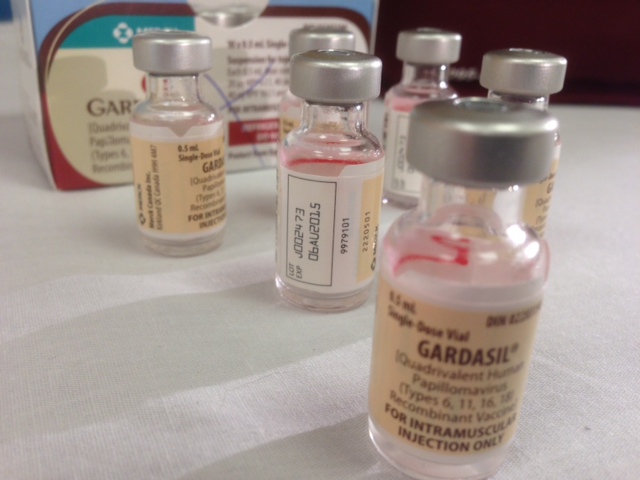TORONTO – There were great strides in personalized cancer care, identifying which patients would be most susceptible to dementia and improving on the HPV vaccine rollout globally. Then there was the flood of technology changing the face of health care— from 3D printing everything from skull implants, organs to prosthetics, an onslaught of health apps and using Skype to train doctors or check in with patients.

It was a busy year in health care innovations. Global News takes a look at some of the highlights in medical research:
Canadian-U.S. team develops ‘sharp-shooter’ cancer drug: $40 million. 10 years. 100 researchers. Resources were poured into a new cancer drug, but North American researchers out of Canada’s own Princess Margaret Hospital said their medicine may hold the key to halting the growth of several cancers.
READ MORE: Canada-U.S. team develops promising sharp-shooter drug aimed at several cancers
Their “sharp-shooter” drug is in the hands of Health Canada and the FDA – both agencies that’ll decide if the medicine is ready for human trials.
While studying human cancers in mice, the doctors found that the drug effectively slowed the progression of a string of cancers – lung, breast, ovarian, colorectal, pancreatic and prostate among many. “We promise you this is the beginning. There will be another drug that we will be filing for next year. And next year and next year until we get this done,” Dr. Tak Mak told reporters at an announcement.
Mak’s wife died of breast cancer in 1998.
- Posters promoting ‘Steal From Loblaws Day’ are circulating. How did we get here?
- Video shows Ontario police sharing Trudeau’s location with protester, investigation launched
- Canadian food banks are on the brink: ‘This is not a sustainable situation’
- Solar eclipse eye damage: More than 160 cases reported in Ontario, Quebec
DNA from 3 parents: It’s ground-breaking, albeit controversial, but U.K. health officials may allow a technique to create babies using DNA from three people. The move supposedly helps couples avoid passing on rare genetic diseases, but opposition groups say the procedure could lead to the destruction of eggs and embryos.
READ MORE: U.K. may allow babies with DNA from 3 people
If British lawmakers agree, the U.K. would become the first country in the world where the technique could be used to create babies.
HPV doses in 1 or 2 shots, not 3: Canadian research out of the University of British Columbia suggests that young girls in Canada could be faring just as well with two doses of HPV vaccine instead of the routine three. Eliminating one of the doses could save money – the price tag on the treatment is on the steeper end – and free up resources, such as nurses doing their rounds immunizing children.
In countries without HPV vaccination programs, removing a third dosage could allow them to consider implementing universal access to the medicine, which keeps cervical cancer away.
READ MORE: HPV vaccine could be given in 2 doses, not 3, UBC research suggests
Cervical cancer is the second most common cause of cancer death in women. In the developing world, protecting against the human papillomavirus via vaccine is only done in about half of young boys and girls.
Global research has even suggested that a single dose of the vaccine generates enough protection against HPV.
Newborn baby ‘functionally cured’ of HIV: In October, Mississippi doctors reported that a baby was “functionally cured” of HIV — a huge step forward in HIV research that could help scientists understand how the disease could be stopped in its tracks.
A drug cocktail of three anti-HIV drugs normally used to treat older infants and adults was used on the baby, born to a mother with HIV. Two years later, the toddler appears to be free of the virus — the little patient isn’t even taking anti-HIV medication anymore.
Understanding dementia: The year wrapped up with an inaugural G8 summit especially devoted to dementia with world health leaders congregating to understand the disease that’s expected to affect millions of people in the coming decades.
The priority? Enforcing national dementia strategies that focus on early detection — this comes on the heels of research that suggests that identifying patients early in their disease may help control their cognitive decline.
Even more, a global study isolated genetic variants in 11 locations on the DNA sequence that may be linked to Alzheimer’s.
READ MORE: ‘Woefully unprepared’ for world dementia epidemic, report warns
carmen.chai@globalnews.ca
Follow @Carmen_Chai





Comments